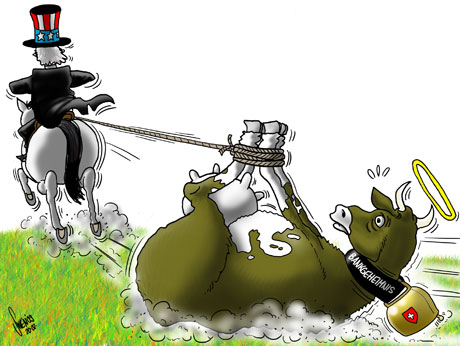Swiss-British bank tax deal ruffles feathers

A deal to end a tax evasion row between Switzerland and Britain has been hailed as a victory for Swiss banks but a blow for the global crusade against banking secrecy.
On Wednesday, the two countries initialled a plan to impose withholding taxes on British assets held by Swiss banks without an automatic exchange of information. Germany has agreed in principle to a similar deal.
The British agreement could raise up to £5 billion (SFr6.5 billion) in withholding tax by 2013. This includes a one-off levy of between 19 and 34 per cent and 48 per cent on future income.
“Overall, my assessment of the tax agreements is positive,” said Patrick Odier, chairman of the Swiss Bankers Association (SBA) in a statement. “They mark important milestones for the Swiss financial centre. As a banker, I am especially grateful that clients have been offered a fair solution for regularising their assets.”
The SBA added that a predicted “mid-three-digit million” franc charge that banks will incur to implement the deal is a small price to pay for avoiding the obligation to hand over suspicious client details to other countries on demand.
“Shabby” deal
But British-based pressure group Tax Justice Network (TJN) is far from happy about the two deals that appear to let Swiss banks off the hook and deal a blow to other parties – most notably the European Union and the United States – that want client information.
Switzerland has come under continued global pressure since the financial crisis to end its status as a haven for tax cheats.
The Swiss authorities have been fighting to achieve this end without relinquishing prized banking secrecy laws. The German and British deals have been hailed as a stepping stone in this direction.
“It is easy to see why the British government, that is imposing austerity measures, would want to have the cash up front, but it is a weak deal that sets back Swiss-UK tax relations and weakens attempts by other countries to tackle tax evasion,” John Christensen, TJN director, told swissinfo.ch.
“The EU is leading the world in pushing for automatic information exchange, which is by far the best way of tackling the problems. It is a mystery to us why two of the EUs biggest and most powerful member states [Britain and Germany] would want to do such a shabby deal at this stage.”
Greek interested
Christensen blamed tax evasion in part for the chronic debt difficulties currently being experienced in Greece, Ireland, Portugal and Italy.
“The message that tax advisors will be sending to their clients is that it is business as usual,” he told swissinfo.ch. “Swiss banking secrecy remains intact operationally and they can continue to get away with your tax evasion, even though there will be higher costs involved.”
Massively indebted Greece is also looking at cutting a deal with Switzerland similar to those of Britain and Germany.
Greek Finance Minister Evangelos Venizelos said earlier this year that Greece now wants to negotiate a withholding tax with Switzerland. Greek Prime Minister George Papandreou believes many of the billions that have been withheld from the Greek taxman are lying in Swiss vaults.
Pressure persists
But Switzerland has not completely brushed aside pressure on banking secrecy and its financial centre.
The EU has not signalled a change from its demand for automatic information exchange despite the deals with powerful member states Britain and Germany.
A spokeswoman for the European Commission’s Tax and Customs Union declined to comment on whether the German and British deals were at odds with the EU approach until the full texts of the agreements were made available.
But Cristina Arigho did hint that the current EU-Swiss savings directive could be re-assessed if it was not “equivalent” with the German and British accords.
Recent noises from the EU about enhancing the savings directive, the success of international demands on Switzerland to improve information exchange and the two new accords have changed the nature of the playing field.
“The continued equivalence of the EU-Swiss agreement will need to be assessed in the light of all these developments,” Arigho told swissinfo.ch. “There can, however, be no doubt that we remain firmly committed to the principles of automatic exchange of information and to their application to savings income within the EU.”
The French media recently quoted unnamed finance ministry officials as rejecting a similar deal on the grounds that it contradicted a commitment to weed out tax evaders. Italy is also unlikely to follow the withholding tax path as it is currently locked into a frosty diplomatic stand-off with Switzerland over tax evasion.
The US is aggressively pursuing tax cheats and the banks in which they stash their wealth. UBS was successfully prosecuted in 2009 and now Credit Suisse and other banks have come into the firing line.
A deal to end the tax dispute between the two countries has reportedly become bogged down by Switzerland’s insistance that bankers should be immune from prosecution.
The cherished Swiss banking confidentiality laws have been under constant attack since the financial crisis of 2008-9.
With many developed – and indebted – countries seeing large holes blown into their tax revenues, cracking down on tax evasion suddenly became a priority.
In 2009, Switzerland was forced to concede enhanced information exchange and renegotiate a host of double taxation agreements to get off an Organisation for Co-operation and Development (OECD) black list of tax havens.
Also in 2009, UBS admitted to aiding and abetting US tax evaders and had to pay a hefty fine. The Swiss government was subsequently forced to hand over the names of 4,450 US clients of UBS to the US authorities.
Several countries, including Britain, Italy, the US and Germany, offered tax amnesties in 2009 and 2010 to give citizens the chance to come clean about tax evasion.
Discovery of tax cheats was enhanced by the illegal sale of Swiss bank client data by a whistleblower. Germany and France were the main purchasers of the controversial data CDs, but information was passed on to other countries.
The US is currently pursuing its clampdown on other Swiss banks. Credit Suisse was recently informed that it was under investigation while several other banks, including cantonal owned enterprises, are thought to have fallen under the spotlight.

In compliance with the JTI standards
More: SWI swissinfo.ch certified by the Journalism Trust Initiative





You can find an overview of ongoing debates with our journalists here. Please join us!
If you want to start a conversation about a topic raised in this article or want to report factual errors, email us at english@swissinfo.ch.